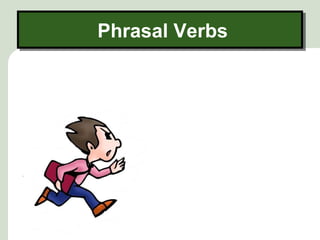
Phrasal Verbs (Guido Alvaro Lopez Mamani)
- 2. Phrasal Verbs Phrasal Verbs Phrasal verbs = verb + particle The particle looks like a Preposition, but it doesn’t function as a preposition. He woke up at 6:30 a.m. Strangers woke him up.
- 3. Particles Particles Particles are part of the verb phrase, and they often change the meaning of the verb. preposition He looked up at the skyscraper. particle She looked up a word in her dictionary.
- 4. Using Phrasal Verbs Using Phrasal Verbs Many phrasal verbs and one-word verbs have similar meanings. wake up = awaken go on = continue off take take off = remove Phrasal verbs are less formal and more common in everyday speech.
- 5. Transitive Phrasal Verbs Transitive Phrasal Verbs 1 1 Transitive phrasal verbs have objects. Most transitive phrasal verbs are separable. object He called up his boss to tell him he had overslept. object He called his boss up to tell him he had overslept.
- 6. Transitive Phrasal Verbs Transitive Phrasal Verbs 2 2 The object can come after the phrasal verb or between the verb and the particle. No At the last minute, the bride wedding called off the wedding. ! object At the last minute, the bride called the wedding off. object
- 7. Be Careful! Be Careful! When the object is a pronoun, it must come between the verb and the particle. A friend called up her at work. object A friend called her up at work. object
- 8. Use each of the phrasal verbs to Practice 1 form three sentences about things that sometimes happen. Example: wake up = awaken The baby often wakes up the parents. parents The baby often wakes the parents up. up The baby often wakes them up. up 1. pick out = select 2. figure out = solve 3. hand in = submit, give 4. take off = remove 5. make up = create 6. let down = disappoint
- 9. Intransitive Phrasal Verbs 1 Intransitive Phrasal Verbs 1 Intransitive phrasal verbs do not have objects. no object He grew up in Egypt. no object She will hang up before she gets into her car.
- 10. Intransitive Phrasal Verbs 2 Intransitive Phrasal Verbs 2 Intransitive phrasal verbs do not have objects. no objects First I worked out for an hour. Then I dressed up and dropped in at the party. No one found out that I didn’t have an invitation!
- 11. Be Careful! Be Careful! Note the difference in meaning between make, make up (transitive), and make up (intransitive). I make up dinner every night. dinner every night. He made up a story about Jill and Joe. make up = invent (transitive) make up = reconcile They made up. They up (intransitive) were friends again.
- 12. What happens before and during a Practice 2 party? Make sentences using the transitive and intransitive phrasal verbs. intransitive Example: dress up I dress up nicely. ask over = invite put on = use clothes 1. 2. set up = prepare straighten up = make neat 3. 4. show up = appear let in = allow to enter 5. 6. 7. run out = not have enough intransitive intransitive
- 13. References References GUIDO LOPEZ JANUARY 31 LA PAZ - BOLIVIA